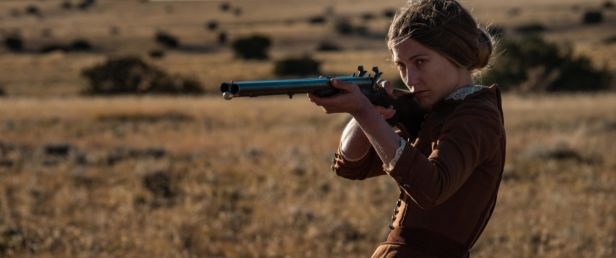Women have typically been confined to background action in the western, this most masculine of film genres, and it is always exciting when a film strays from that tradition. The Wind, the solo directorial debut from American director Emma Tammi, does just that. Focusing on a kind of character from the western that is often taken for granted or ignored, the film follows Elizabeth “Lizzie” Macklin (Caitlin Gerard), a young wife who lives alone with her husband Isaac (an excellent Ashley Zukerman) in the middle of the American west. She clearly loves him — their relationship, one of dialogue and understanding, is in fact exceptionally healthy — and despite what we may expect from a feminist western, her troubles do not come from him. What she struggles with the most is the loneliness and monotony of this strange sort of existence, and the film goes to certain lengths to underline those realities.
Shots of the seemingly endless horizon conjure up the maddening isolation of those vast expanses of land; while the dry heat of the blazing sun can be felt in Lizzie’s efforts as she works in her garden. The camera lets us in on all her emotions, and Caitlin Gerard’s genuine performance helps stray the character away from cliche.
Despite this realistic register, The Wind in fact attempts to derive much of its dramatic heft from the unconventional structure of its narrative, full of twists and turns and revelations. The film opens on Lizzie alone, visibly on edge, guarding her house with a rifle, and the way she got there is progressively revealed through her own traumatic flashbacks. One day, Lizzie and Isaac suddenly found themselves with new neighbours — a setup which offers an original way to look at the constructed nature of civilisation on the edge of the world. But rather than fully explore the implications of this idea, the film only evokes it to create a vague feeling of dread and suspicion.
This evasiveness affects most of the film’s inventive ideas: they are touched on rather than developed, and without any solid ground to anchor our spurred boots in, the resulting sensation is one of confusion rather than fear. The film’s complicated narrative structure needlessly interrupts what is at times an engrossing descent into madness and fear, and takes away from the visceral qualities of the setting. Even manifestations from killer goats, crazy priests, and malevolent winds do not hold interest for very long. The films ends on a chilling twist rich in feminist connotations, but which does not exactly withstand scrutiny — although it is a surprise, it comes a little out of the blue.
